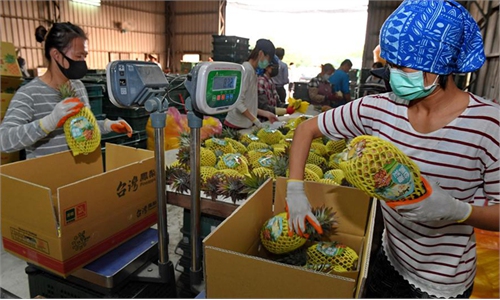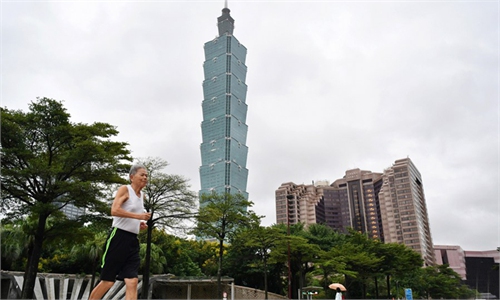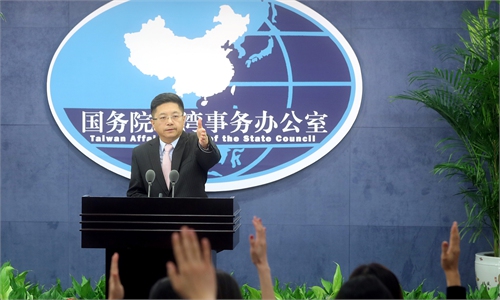
The Taipei 101 skyscraper in Taipei, southeast China's Taiwan. Photo: Xinhua
The Chinese mainland will keep consistency of its policies toward Taiwan, as seen from this year's government work report delivered by Premier Li Keqiang on Friday, however, some changes in the wording in the highly anticipated annual report, tougher compared with last year's, were seen as reflecting possible policy adjustments.
At the opening of the fourth session of the 13th National People's Congress (NPC) on Friday, Premier Li said in his annual government work report that the central government will stick to the major principles and policies on work related to Taiwan, including the one-China principle and the 1992 Consensus, and promoting the peaceful development of relations across the Taiwan Straits and national reunification.
We will remain highly vigilant against and resolutely deter any separatist activity seeking "Taiwan Independence," said Li, which is in contrast to the 2020 government work report, which read that the central government will "resolutely oppose and contain secessionist activities of Taiwan independence."
The expression "promoting national reunification" appeared for the second year in a row, since the 2020 two sessions which observers said shows the determination to reunify and oppose secessionism. The year 2020 is regarded as a key year for the transition from anti-secessionism to pro-reunification.
The change shows that the mainland is fully aware of the rising risks and seriousness of Taiwan secessionism, and the tougher statement means that the mainland will act on deterring secessionists, Wang Jianmin, a Taiwan affairs expert at the Chinese Academy of Social Sciences, told the Global Times on Friday.
Yang Yizhou, vice head of All-China Federation of Taiwan Compatriots and member of the national committee of CPPCC, told the Global Times on Friday that Taiwan secessionism is the most significant threat to cross-Straits relations. And the Taiwan-related statement in the government work report shows that the central government has zero tolerance for Taiwan secessionists and will never allow any act of separating the motherland and undermining the peaceful development of cross-Straits relations.
"As the situation develops, the Anti-Secession Law still needs to be further deepened and refined," Yang said.
Shaw Chong-hai, former head of the school of social sciences at Chinese Culture University in Taiwan, told the Global Times that the report shows the consistency of the central government's work on Taiwan, and that the determination to maintain peaceful development across the Straits and promote national reunification is unshakable.
Zhang Wensheng, deputy dean of the Taiwan Research Institute at Xiamen University, told Global Times that the consistency shows that the mainland firmly grasps the dominant power in cross-Straits relations, and separatists should not have any illusions.
The Taiwan secessionists and international anti-China forces will not succeed in trying to force the mainland to give up the historic mission: the goal of the great rejuvenation of the Chinese nation, and the aspiration of the 1.4 billion Chinese people for national reunification, Li said in the report.
Experts said that although the report mentioned promoting peaceful development of cross-Straits relations and national reunification, it does not mean the mainland will give up non-peaceful means to crack down on secessionists and safeguard national reunification.
Li said that the central government will improve the systems and policies for safeguarding the wellbeing of Taiwan compatriots and ensure they enjoy the same treatment on the Chinese mainland as local residents.
Experts reached by Global Times said the move shows the efforts and sincerity of the mainland in promoting cross-Straits people-to-people exchanges.




